Review of Igby Goes Down
Introduction
Jason “Igby” Slocumb (Kieran Culkin), an aloof, wise-acre misfit is ironic about everything except his barely veiled contempt. Whether it’s for his quietly raptorial mother, Mimi (Susan Surandon, doing her best impression of a bind of coiled rope), his incumbent-capitalist brother, Oliver (Ryan Phillipe), the ideology of success spouted by Godfather D.H Banes (Jeff Goldbum), or simply life itself, Igby trudges through on a wry haze of caustic observations and knowing disdain. His cool surface is disturbed however by the arrival of Sookie Sapperstein (Claire Danes), a student who falls for Igby’s adolescent confusion, only to be courted by Oliver, leaving Igby stranded in an isolation of his own design.
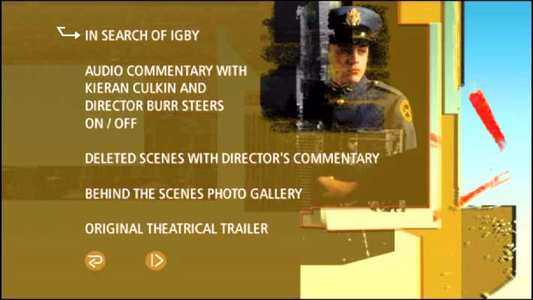
Video
Director Burr Steers and Cinematographer Wedigo von Schultzendorff craft many moments of minimal pictorial elegance, all well served on this flawless transfer.
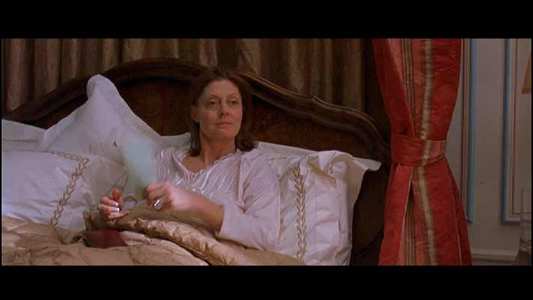
Audio
A soundtrack full of deflated, angsty alternative rock (Coldplay, Travis, The Beta Band) makes awkward bedfellows with an eclectic original score that shifts from playful, Bizet-esque classicism to bluesy drum beats. The 5.1 track never gets a chance to shine, but it’s hard to complain.
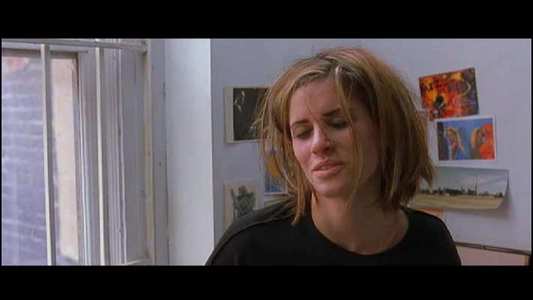
Features
There’s a reasonable, rather cursory documentary on the production (focusing particularly on casting) and a nice collection of deleted scenes with or without commentary from Steers. A trailer and photo gallery don’t shed much light, so it’s left to a commentary with Culkin and Steers to explore the film’s background. They don’t. It’s engaging for a while, Culkin and Steers making casual, light-hearted hosts, but the rather insouciant smugness starts to grate long before the end credits.

Conclusion
The restless anomie pervading the transition from youth to adulthood has become one of the fondest, and flakiest cinematic sub-genres since Dustin Hoffman tuned in and dropped into the sack with Anne Bancroft in `The Graduate`. Whilst James Dean and Marlon Brando personified the transformation with fiery, impassioned martyrdom, ‘The Graduate’ reset the mould by replacing the passion with a wilting nausea, a rootless disaffection grounded in bafflement rather than rebellious anger. And whilst `Igby Goes Down` essentially updates those remote mod-ish ticks for a new decadent netherworld, dripping in sarcasm and emotional disconnection, there are enough moments of black humour, and even the occasional lilting moment of human feeling to give it its own ragged spirit.
Igby’s character and trajectory ultimately amount to little more than a re-spinning of `Catcher in the Rye`, and whilst the episodic narrative is never totally absorbing, there’s enough fluid Holden Caulfield romanticism to sway most viewers on a breeze of chilly nostalgia. Culkin plays Igby with just enough frail winsomeness to offset his relentless supply of knowing observations, delivered with a measured balance between the Manhattan intelligentsia comedies of Woody Allen and Whit Stillman. Elsewhere, Goldblum caresses his subdued comedy histrionics into a memorable silent malevolence; Surandon, using words like razor-sharp icicles, convinces as a woman whose frozen soul has vanished into her skin. Best of all is Bill Pullman in an extended cameo, and whether he’s wrestling with a faux `Fair Harvard` accent, or collapsing in a bloody breakdown, he is moving and revelatory as a man exposed.
Burr Steers’s direction vies for a disassociated tonelessness as the story veers ineffectually from broad comedy to dark drama, presumably in an attempt to evoke the imbalance between Igby and the austere East Coast aristocracy who surround him. Despite this, the fast-paced script and enthusiastic performances will have many audience members yearning for the violent immediacy and spirited disconnection of youth. It’s fitting then that the final result mimics that period with such clarity: stumbling, disjointed, overly excitable and somehow charming with hindsight.
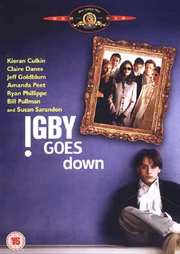
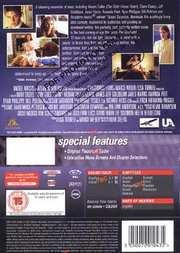


















































Your Opinions and Comments
Be the first to post a comment!